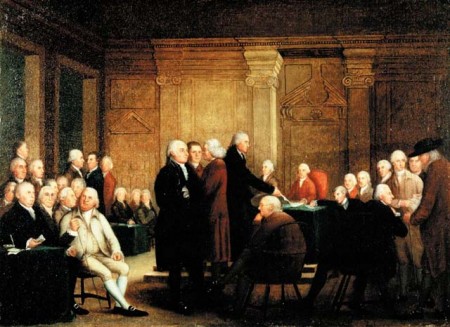CAN THE STATES BECOME SOVEREIGN ONCE AGAIN?
by Dan O’Brien

(Aug. 9, 2011) — In reply to JB Williams’ excellent article in the August 8th edition of The Post & Email subtitled, “CAN AMERICANS FIND A “COMMON CAUSE’ TO EFFECT CHANGE?” I would suggest that sooner, rather than later, we must reactivate the Continental Congress, shut down the Central Government, and withdraw the military back to state militia status, save for a small defensive military under command of the Continental Congress.
This is accomplished by each state seceding from today’s mock 1871 United States government, to again become sovereign nation states, which secession can readily be accomplished by act of their existing state government; and to send three delegates to the Continental Congress, whose job it would be to conduct international affairs and wind down the affairs of the central government. It is anticipated that each state would readopt a republic form of government and temporarily abide by decisions of the Continental Congress.
- For the most part the man on the street is not directly affected by secession.
- The states would each be fully responsible for their own existence, but would continue in interstate commerce, possibly through use of the UCC.
- This finally kills martial rule that was declared via Abraham Lincoln’s Leiber codes, the Federal Reserve System, the Federal Reserve Notes, and many debts.
- All courts would cease Admiralty jurisdiction, therefore the fictional (all capitalized, and/or abbreviated) names associated with people would be without merit. Federal rules of criminal and civil procedure would go out the window. People, as sovereigns, would not be subject to existing statutes, but rather would once again be beholden to the unwritten law that requires they do no harm.
- States would necessarily reestablish militias for their defense.
- National banks and other national corporations would only retain authority in the state wherein they reside. Permission to operate in other states would need to be reestablished and ought not be granted to companies that were too big to fail.
- Counties would need to re-establish de jure common Law judicial systems.
- Counties would also need to address the consequential loss of federal programs, which may prove a boon to education, health, environment, local autonomy, small businesses and transportation, for example. Volunteers and charity would become important sources of aid to the aged, disabled, and poor.
- Inter-county and interstate commerce would soon redevelop along former lines to continue flows of fuel, power, water, produce and other necessities.
- Public or private state and county banks could quickly develop to serve as the backbone for a new and thriving economy, each sovereign nation-state being at liberty to meet the needs for currency and credit as it sees fit.
After the dust has settled, each state would decide on future participation in a union of states, or one of several unions of states, or to continue in independent nationhood, either reformed under a de jure, prior to 1860 (rightful) State and U.S. Constitution and laws that were in effect at that date, or perhaps under new constitutions.
